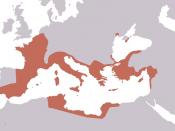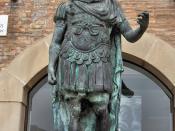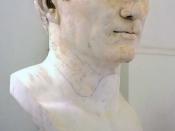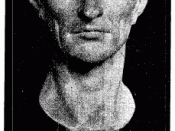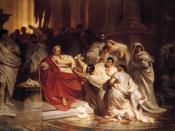The Constant Parallels of Julius Caesar Throughout the play, Julius Caesar, by William Shakespeare, there are constant parallels used in describing people versus their community. The play begins in the beautiful streets of Rome and ends in bloody chaos. Shakespeare chooses to add in many different examples using the environment of the play to express what the people are thinking. Caesar is rich and powerful but ends up week, just as the environment in the play. The blood on the battlefield is like the blood of Caesar and the others who were murdered or committed suicide. And the drastic changes in the community are the same as the changes in the people who dwell there.
Rome, a beautiful place full of flowers, perfectly lined streets and perfectly lined attitudes to match. Caesar is in charge, the commoners love him, the rich love him, and nothing could be more perfect.
Caesar's greatness reflects the greatness of the town, a ruling power and a cooperative nation. The flowers in Rome represent the love and unity that the people have towards Caesar. But that can be taken two ways, either that the people, like flowers, just stand there and look pretty or that they reflect on how they are treated. A flower will live and thrive if given enough sunlight and water but without the "ruler"� how can it survive. As is in this play.
Red, pain, death, these are all things that people think of with one simple word, blood. Caesar was "stabbed in the back"� by the one person he trusted and the environment in the play was drastically changed also, from the happy streets of Rome to being stabbed in the back, literally, at the battlefield. Once Caesar was killed the world around him slowly started to die as well. Rome slowly became the small homes of the conspirators, then the towns outside of Rome and finally the bloody end far from home, far from the happiness that once was. This is just like how the people of Rome slowly fell from the peaceful town into the dismembered body that was Rome for quite some time. Time that was only changed by a new birth, a new ruler, a person to change the world, as they knew it.
A rich environment is full of trees, flowers, and fresh air; basically Rome was the stereotypical utopia. Caesar was rich and powerful, strong, in charge of his land, ready for any thing. Or at least he thought that he was. As soon as Caesar fell so did the environment. The "rich"� land was now baron; the rich ruler was now dead. Coincidence, I think not. Shakespeare had this intent in his mind; he knew that to add an emphasis on the drastic changes of the people with the death of Caesar that showing the same changes in the environment would make a big impact to the reader or listener. After the death of Caesar the political sense came to a major downfall, there was no order. When Rome was such a quaint little place everything was fine and then again there was no order at the battlefield. This was just yet another parallel in Shakespeare's great work.
Using parallels in writing benefits a lot of people. The reader, the listener, and of course the writer themselves. It makes the story more interesting. This particular parallel helps exaggerate the sense of death even further. A community leader dies and in return the community itself dies. Caesar was a great ruler, and Rome was a great land, but ending with a new ruler leaves room for a new land as well. A land that in turn can be the same or even better than the previous. A land only the reader has left to imagine.
